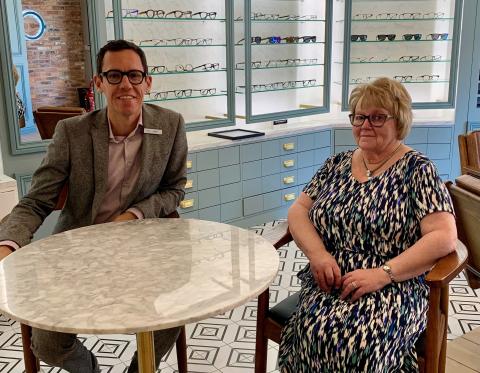National Eye Health Week – making eye health a priority is key to preventing sight loss

This National Eye Health Week (23 – 29 September 2024), the Public Health Agency (PHA) is highlighting the importance of looking after your eyes through all stages of life, and this includes booking your regular eye test.
Dr Jackie McCall, Consultant in Public Health at the PHA, said: “One-in-five of us will experience sight loss in our lifetime, but more than half of sight loss can be prevented. There are lots of ways you can keep your eyes in better shape such as attending regular eye tests, being physically active, eating healthily and stopping smoking.
“A routine eye examination can often pick up the first signs of a sight loss condition even before there are any symptoms. Early detection and intervention could save sight, or get a condition under control. As well as helping people to see better, a routine eye test can also detect a range of life-threatening conditions such as diabetes, cancer and heart disease, among others.”
This was the case for 71-year-old Hazel Thompson, from Ballybogey, when she attended her regular eye test and found out the pressure behind her eyes was too high. She was immediately referred to hospital for further investigations.
Hazel explained: “I had gone for my normal eye test when my optometrist Brian spotted that the pressure behind my eyes was too high. He then brought me back three days later to check it again and it was still high, so I was sent to Causeway Hospital.
“After that I saw a specialist in Mid Ulster Hospital and I was put on eye drops for a few months, but unfortunately these were not effective in reducing the pressure and I was subsequently diagnosed with glaucoma in both eyes.”
Hazel had to have surgery in her right eye and two rounds of laser treatment to save her sight. Without attending her regular eye test, Hazel’s diagnosis could have been much worse and she could have lost her sight.
She added: “Thanks to Brian detecting the change in pressure in my eyes, my sight has been saved. I recovered well from my treatments and can see well again. If I wasn’t referred to hospital then I could have lost my sight completely.”
Brian McKeown, optometrist and Vice Chair at Optometry NI, said: "I would love to say that cases like Hazel's are rare, but the reality is optometrists are managing asymptomatic, sight threatening conditions on a daily basis. If this campaign encourages some more people to avail of their sight test and potentially saves someone's sight, that would be fantastic. If you're reading this and you know someone who has never had a sight test, give them a nudge, and send them to their local optometrist."
Raymond Curran, Head of Ophthalmic Services at the Strategic Planning and Performance Group, Department of Health, said: “We know that sight is the sense that we fear losing most, and that a high proportion of sight loss in Northern Ireland is preventable. A regular visit to your local optometrist can detect sight-threatening conditions early, which can help make treatment outcomes better. These sight tests should be every two years for most of us, or annually for older or younger groups, or those with certain medical conditions. In addition, the Northern Ireland Primary Eyecare Assessment and Referral Scheme (PEARS) will see you promptly, without charge, if you develop a sudden change in vision, pain, or discomfort.”
Robert Shilliday, Northern Ireland Director at RNIB, added: “We are glad to work with our colleagues in public health to reduce preventable sight loss and welcome campaigns like this to highlight how the general public can look after their sight. For anyone with an existing eye condition requiring ongoing treatment to try to preserve vision, we encourage you to follow guidance given, attend any screening appointments, and seek advice from your optometrist or reach out to one of our Eye Care Liaison Officers (ECLOs) if you are unsure about anything.”
Dr McCall concluded: “We would encourage everyone to make a conscious effort to keep their eyes in good shape. After all, looking after your eyes is just as important as looking after the rest of your body. If you notice a sudden change in vision, flashes or floaters, contact your local optometrist as soon as possible.”
Other important steps you can take to maintain good eye health include:
- Stopping smoking – for outlined guidance and support visit www.StopSmokingNI.info
- Protecting your eyes in bright sunlight and/or glare. For tips, visit www.CareInTheSun.org
- Eating healthily and exercising regularly – for help and advice visit www.ChooseToLiveBetter.com
- Wearing safety goggles to protect your eyes while doing DIY, gardening, sporting activities and/or in the workplace if required.
- Taking regular and short breaks if working at a computer screen, phone or tablet.
For more information on how to look after your eyes, visit www.pha.site/LookAfterYourEyes
Eye examinations are free for many individuals. For information regarding eligibility for a free NHS eye test, please visit www.nidirect.gov.uk/eye-care
For information on the NI PEARS scheme, visit www.online.hscni.net/our-work/ophthalmic-services/eyes/
